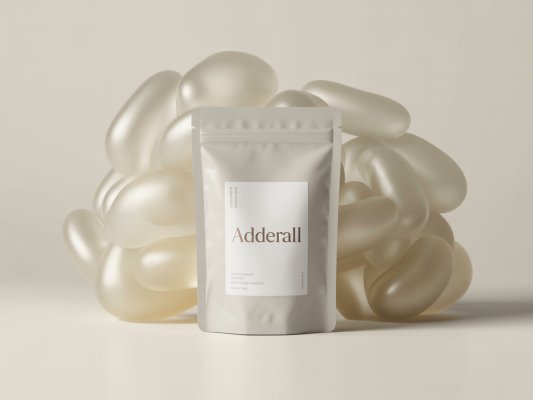
Adderall
Description
Adderall is a prescription medication primarily used to treat attention deficit hyperactivity disorder (ADHD) and narcolepsy. It contains a combination of amphetamine salts and works by stimulating the central nervous system. This article provides a comprehensive yet accessible overview of Adderall, covering its uses, dosage, side effects, and more.
Quick Overview: Adderall At-a-Glance
- Key Benefits: Improves focus, attention, and reduces impulsivity in individuals with ADHD; helps manage daytime sleepiness in narcolepsy.
- Primary Mechanism: Increases dopamine and norepinephrine levels in the brain, enhancing neuronal signaling.
- Best For: Individuals diagnosed with ADHD or narcolepsy under the guidance of a healthcare professional.
- Typical Dose Range: Highly variable, ranging from 2.5mg to 60mg daily, individualized by a doctor.
- Key Caution/Consideration: High potential for misuse and dependence; cardiovascular and psychiatric side effects are possible.
Table of Contents
Categories & Effectiveness
Learn about our rating methodologyBrain Health
Dopamine Support
10/10Strong evidence of effectiveness
Cognition
Concentration & Focus
7/10Strong evidence of effectiveness
Impulse Control
7/10Strong evidence of effectiveness
Planning & Organization
7/10Strong evidence of effectiveness
Reduced Distractibility
7/10Strong evidence of effectiveness
Energy & Alertness
Alertness & Vigilance
7/10Strong evidence of effectiveness
Sustained Energy
7/10Strong evidence of effectiveness
Mental Stamina
4/10Moderate evidence of effectiveness
Dosage & Side Effects
Recommended Dosage
Potential Side Effects
Bioavailability & Half-Life
Interactions & Stacks
Recommended Products
Leistungsstarke Formulierung für deine Zwecke - 40 Tabletten mit Grünem Tee, Chili-Extrakt, Niacin, Chrom und B-Vitaminen - 20-Tage-Vorrat (40 Tabletten, Vitalplants)
- Rated 4.9 stars by 278 customers
- Premium quality ingredients
EXVital® L-Theanin, 180 vegane Kapseln, 400 mg L-Theanin pro Kapsel, aus Grüntee Blattextrakt, L-Theanine Aminosäure, vegan & ohne Zusätze, laborgeprüft
- Rated 4.8 stars by 82 customers
- Premium quality ingredients
Aktive Kohle 200 mg - 200 Kapseln
- Rated 4.4 stars by 1,977 customers
- Premium quality ingredients
As an Amazon Associate we earn from qualifying purchases. Prices and availability are accurate as of the date/time indicated and are subject to change.
Benefits by Use Case
ADHD Symptom Management
Adderall effectively reduces ADHD symptoms such as inattention, hyperactivity, and impulsivity by increasing dopamine and norepinephrine levels. This leads to improved focus, concentration, and impulse control. Studies show that it can significantly enhance daily functioning for individuals with ADHD.
Narcolepsy Treatment
Adderall helps manage daytime sleepiness associated with narcolepsy by promoting wakefulness and alertness. It achieves this by stimulating the central nervous system and affecting neurotransmitter activity. It is typically used as a third-line treatment option, after other medications have been tried.
Cognitive Enhancement
Adderall is sometimes used off-label to enhance cognitive functions such as working memory, attention, and inhibitory control. However, studies suggest that these effects are modest in healthy individuals and that users may overestimate the drug's cognitive benefits.
Mechanism of Action
Frequently Asked Questions
Where to Buy Adderall
Based on quality, price, and customer reviews, here are our top recommended Adderall supplements:
Aktive Kohle 200 mg - 200 Kapseln
- Rated 4.4 stars by 1,977 customers
- Premium quality ingredients
serotalin® HAPPY MOOD KAPSELN | Mit Johanniskraut, Griffonia & L-Tryptophan | Vitamin D3 hochdosiert +B1 +B2 +Niacin +Mangan - ohne Koffein | 60 vegane Kapseln
- Rated 4.2 stars by 518 customers
- Premium quality ingredients
Leistungsstarke Formulierung für deine Zwecke - 40 Tabletten mit Grünem Tee, Chili-Extrakt, Niacin, Chrom und B-Vitaminen - 20-Tage-Vorrat (40 Tabletten, Vitalplants)
- Rated 4.9 stars by 278 customers
- Premium quality ingredients
As an Amazon Associate we earn from qualifying purchases. Prices and availability are accurate as of the date/time indicated and are subject to change.
Summary & Expert Opinion
For those seeking a deeper understanding, Adderall's mechanism involves complex interactions with dopamine and norepinephrine transporters (DAT and NET) in the brain. It not only inhibits their reuptake but also promotes the release of these neurotransmitters into the synapse. Furthermore, Adderall interacts with trace amine-associated receptor 1 (TAAR1) and affects the vesicular monoamine transporter 2 (VMAT2), contributing to its potent stimulatory effects. The metabolism of Adderall involves the hepatic enzyme CYP2D6, and genetic variations in this enzyme can significantly affect drug clearance and individual response. The 3:1 ratio of dextroamphetamine to levoamphetamine is designed to optimize the balance between central nervous system stimulation and peripheral side effects, though individual responses vary. While some studies suggest cognitive enhancing effects in healthy individuals, these effects are often modest and may be accompanied by a perceived, but not necessarily real, improvement in performance. Long-term use of Adderall can lead to tolerance and dependence, and abrupt cessation can result in withdrawal symptoms. The biomolecular mechanisms of addiction involve changes in gene expression, particularly the overexpression of ΔFosB in the nucleus accumbens, a key brain region involved in reward and motivation. The risk of cardiovascular events, although rare, necessitates careful screening for pre-existing conditions and monitoring of blood pressure and heart rate. Furthermore, recent studies highlight the potential role of the gut microbiome (pharmacomicrobiomics) in influencing Adderall's metabolism and, consequently, its effects. All of these factors make Adderall a medication that requires careful consideration, close monitoring, and a thorough understanding of its potential benefits and risks.








